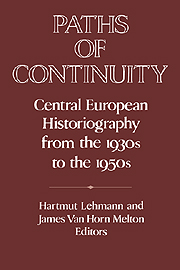Book contents
- Frontmatter
- Introduction: Continuities in German Historical Scholarship, 1933-1960
- 1 German Historiography from the 1930s to the 1950s
- 2 Friedrich Meinecke (1862-1954)
- 3 Change and Continuity in German Historiography from 1933 into the Early 1950s: Gerhard Ritter (1888-1967)
- 4 Hans Rothfels (1891-1976)
- 5 Franz Schnabel (1887-1966)
- 6 Heinrich Ritter von Srbik (1878-1951)
- 7 “Historical Social Science” and Political Myth: Hans Freyer (1887-1969) and the Genealogy of Social History in West Germany
- 8 Some Observations on the Work of Hermann Aubin (1885-1969)
- 9 From Folk History to Structural History: Otto Brunner (1898-1982) and the Radical-Conservative Roots of German Social History
- 10 Werner Conze (1910-1986): The Measure of History and the Historian's Measures
- 11 Continuity, Innovation, and Self-Reflection in Late Historicism: Theodor Schieder (1908-1984)
- Index
10 - Werner Conze (1910-1986): The Measure of History and the Historian's Measures
Published online by Cambridge University Press: 05 January 2013
- Frontmatter
- Introduction: Continuities in German Historical Scholarship, 1933-1960
- 1 German Historiography from the 1930s to the 1950s
- 2 Friedrich Meinecke (1862-1954)
- 3 Change and Continuity in German Historiography from 1933 into the Early 1950s: Gerhard Ritter (1888-1967)
- 4 Hans Rothfels (1891-1976)
- 5 Franz Schnabel (1887-1966)
- 6 Heinrich Ritter von Srbik (1878-1951)
- 7 “Historical Social Science” and Political Myth: Hans Freyer (1887-1969) and the Genealogy of Social History in West Germany
- 8 Some Observations on the Work of Hermann Aubin (1885-1969)
- 9 From Folk History to Structural History: Otto Brunner (1898-1982) and the Radical-Conservative Roots of German Social History
- 10 Werner Conze (1910-1986): The Measure of History and the Historian's Measures
- 11 Continuity, Innovation, and Self-Reflection in Late Historicism: Theodor Schieder (1908-1984)
- Index
Summary
It strikes me as somewhat ironic that a biographical approach should be deemed the most suitable method for an examination of continuities in German historiography, if one looks at the general topic of these probings into the history of historiography and the leading question about the rise of social history in Germany. When asked to engage in writing biography one cannot help remembering that we as students in the late 1950s and early 1960s had absorbed at least that much of the new orientations in historiography to regard a biographical approach as utterly outdated. Reducing political history to the lives of “great men” was distinctly out of favor. Even more controversial, one would think, is the attempt to approach the history of an academic discipline via the biographies of their masters. Wissenschaji, as they understood it, purported to place die Person entirely behind die Sache. A few preliminary reflections may therefore be in order.
It is necessary to acknowledge our peculiar hermeneutic situation. For various reasons, we are even more deeply implicated in the subject of our study than one usually is as a historian. The masters, whose work is to be scrutinized, have been our teachers. At least intellectually, they had an impact on our own formation as professional historians.
- Type
- Chapter
- Information
- Paths of ContinuityCentral European Historiography from the 1930s to the 1950s, pp. 299 - 352Publisher: Cambridge University PressPrint publication year: 1994



